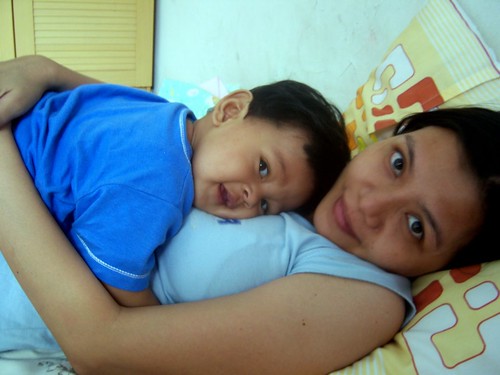26th Sunday in Ordinary Time
Picture: cc Jimmie
Sisters and brothers, when I was about 13 years old, I was taught a lesson that has remained with me till this day. In school that year, we were introduced to potato printing. It was quite simple. You cut a potato in half. Carve some designs on the flat surface. Coat it with different coloured paint. And then use the potato as a seal to print designs on paper. The result was quite beautiful. And, for once, I did slightly better than my usual borderline passing grade in art class. Proud of my achievement, I decided not to throw my potatoes away. I carefully wrapped them in a clean plastic bag. And tucked them away in a drawer. Thinking that they might be useful when we again had to do potato printing in class.
You can probably guess what happened next. Some time later, when I took out my prized possessions to admire them, what I saw shocked and traumatised me. The potatoes were swimming in a disgusting looking fluid. Which smelled really bad. And, on closer inspection, I noticed that little white worms were crawling all over them. The sight gave me goose-bumps. And not in a good way. My precious potato printing set had turned into a mouldy maggot-infested mess. And this is the lesson I was taught that day. Not the technique of potato printing. But the truth that, however precious they may be, some things just can’t be hoarded. Trying to do so will only leave you with a drawer-full of decomposition and decay. A bag with a very bad smell.
Some things just can’t be hoarded. Our Mass readings teach us a similar lesson. In the second reading, the rich are given a dire warning. Your wealth is all rotting… All your gold and silver are corroding away… But we all know that silver and gold do not corrode. So what does the reading mean? Well, for one thing, we also know that although gold may not actually corrode, it’s financial value can rise or fall depending on supply and demand. The same can be said for the spiritual value of material riches. It too can rise and fall depending on how we use it. If we use our wealth to benefit others, then we gain spiritually from it as well. But when we anxiously cling to our possessions. Allowing them to possess us. When we seek to hoard them for our own selfish purposes. Keeping much more than we actually need. And depriving others of what they require to survive. Then our wealth turns into a burning fire. It consumes us. Destroys us. Decomposes us. Gives us a really bad spiritual smell.
And what is true of material wealth is true also of spiritual blessings. In the first reading, God decides to widen the circle of those who enjoy the gift of God’s spirit. A gift that enables people to speak and to act in the power of God. Whereas, before, Moses was the only one who enjoyed such a blessing. Now, seventy elders are allowed to share in this happy privilege. Not only that, but two other men, who had not been present at the original spirit-distribution ceremony, also find themselves moving in the spirit. They too begin to prophesy. To speak in the power of God. And Joshua, Moses’ assistant, wants to stop them. Probably because they haven’t been officially authorised. They have no public entertainment license from the police. But Moses sets Joshua straight. Like material wealth, the spirit of God is not meant to be hoarded. It cannot be monopolised. If only the whole people of the Lord were prophets, and the Lord gave his Spirit to them all!
This same lesson, which Moses teaches Joshua in the first reading, Jesus teaches John in the gospel. Like Joshua, John too wants his Master to stop someone from doing God’s work without a license. But Jesus declines. You must not stop him… Anyone who is not against us is for us. Jesus then points out the great danger faced by the one who tries to monopolise and to hoard spiritual gifts. This tendency becomes a millstone round his neck. Dragging him into the depths of destruction.
Which is why it is better not hoard. Not to be possessive. Neither of material wealth. Nor of spiritual gifts. Possessiveness causes harm. Not just to others. But also to ourselves. Better for us to cut off our possessive tendencies. And so enter into life. Rather than to cling to them. And be thrown into hell where their worm does not die nor their fire go out. It’s not just potatoes that cannot be hoarded. The same can be said of anything of true value. Whatever is truly valuable only remains valuable when we stop clinging to it. When we refrain from hoarding it. From monopolising it. From controlling it. When we are able to let it go. This is true of material possessions. And also of spiritual gifts. Of inanimate objects. And even of people.
We know this. So why then do we still insist on clinging? Why is it so difficult for us to not be possessive? I’m not sure, sisters and brothers. Perhaps the reasons are many and varied. Sometimes it has to do with pride and attachment. As it was with me and my potatoes. I took pride in them. They reminded me of a past achievement. And so I clung stubbornly to them. Refusing to let them go. At other times, we hoard because we are anxious and insecure. The future seems uncertain and frightening. Who knows if I’ll be able to repeat my performance in class? Better to keep these tried and tested potatoes now. Just in case. My hoarding is a foolish attempt to control an uncertain future.
And yet, when we do this. When we store up and monopolise our treasures. We end up doing harm. Harm, first of all, to others. Such as when the accumulation of great riches by a very small percentage of people, actually deprives the vast majority from enjoying a decent life. You may recall that, according to a recent Oxfam report, by 2016 (just a few short months away), the richest 1% of the world’s population will own more than half of the world’s wealth. The hoarding of material riches leads to inequality and suffering. Violence and conflict.
We harm others also when we try to control them. To stop them from doing God’s work. Simply because they do not seem aligned to our own agenda. Our own plans for the future. Of course, it is necessary to organise and plan and order all our efforts at doing the work of God. But we also need to be careful that, in the process, we don’t stifle the often unpredictable workings of the Spirit. For to do so is to oppress others. And not just others. Our possessive tendencies also eventually harm ourselves. They make us less sensitive to the subtle workings of grace. We see only what we want to see. And we focus only on the gifts of God. Rather than the God who is the Giver of all good gifts.
I’m reminded of a story that’s told of someone who once visited a village in Southern Africa, and got the children there to play a game. He placed a huge pile of sweets under a tree. And told the children that, when he gave the signal, they were to run as fast as they could to the tree. The child who got there first would get to keep all the sweets for himself or herself. To his surprise, at the signal, the children held hands and ran together. Reached the tree together. And proceeded to enjoy the sweets together. When asked why they did this, the children replied with a question of their own. How can one of us be happy, they said, if the rest of us are sad?
How can one of us be happy, if the rest of us are sad?
Sisters and brothers, are there perhaps some potatoes in your life that you need to let go of today?




